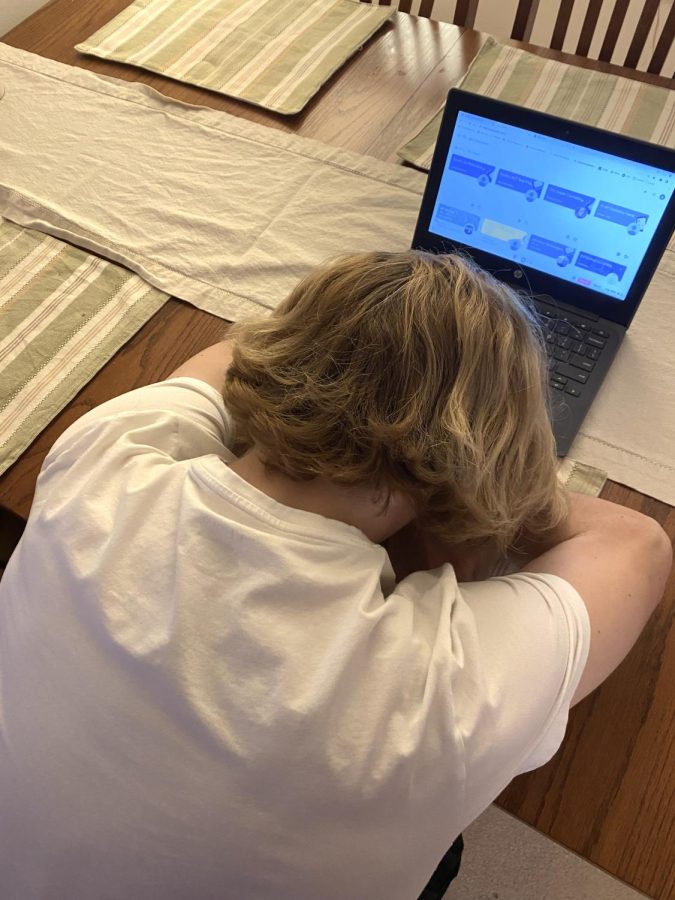Students deserve snow days, not e-learning days
E-Learning days can result in burnout taking the form of students exhausted at their kitchen tables.
April 14, 2023
Since the industrial revolution, consumer products have been developed under the assumption that consumers will purchase them because of their ability to reduce the amount of time and labor necessary to complete a task. With the advent of personal computers becoming prominent in people’s homes and offices in the 1980s, it was the hope of many that their workload would diminish, allowing them to follow their true passions and reconnect with the world around them. However, instead of an environment in which they could follow individual pursuits at their leisure, they were instead met with the dystopian reality that they were now required to output higher amounts of productivity in the same amount of time. They’re already stressful 40-hour work week was transformed into a nightmare of sleep deprivation, stress, and adverse health effects due to such extended and intense periods of desk work that we as a society now consider standard. This increased demand of American workers is a natural byproduct of capitalism, as company profit is prioritized over the welfare of employees.
Just like in corporate America, schools have implemented computers into their curriculum as a way to increase student productivity. A recent example of this is snow-days have been converted into “E-Learning days”, where students are forced to fulfill course requirements online during extreme winter weather. While this practice is beneficial in the sense that it keeps the school year progressing as originally scheduled, students are not receptive to being made to attend a sub-par version of their classes during a circumstance which would have previously allotted them a much appreciated break. Learning through a computer screen often feels alienating, and can limit some people’s ability to comprehend course material.
Ever since early-to-mid 2020, children all across the nation have been forced to adhere to ridiculous expectations that they fulfill their school curriculum requirements online from home. It’s absolutely ludicrous to expect students, especially those in their early developmental stages, to possibly focus and absorb their age-appropriate material in such an unengaging and alienating environment. While “E-learning”, an ironic term considering many students find it difficult to focus and retain information when learning online, was the best method to keep children on track for graduation during the extended isolation of the COVID-19 pandemic, using it to fill in the gaps of a few missed school days due to weather related events, which prior to 2020 were already built into and accounted for by the school calendar, is utterly gratuitous.
Furthermore, teachers themselves are overwhelmingly uninterested in using this inefficient method of teaching for such an insignificant amount of time. Humanities teacher Ben Carpenter said, “Outside of the defined structure of distance learning, very little can be accomplished in an incidental online class… Any substantial assignment will misalign the class’s progression as many students either can’t access the material or are doing other things at the time.” It’s much more sensible to briefly pause the class schedule of any given subject during extreme weather, rather than try to teach it inadequately online. Moreover, many teachers have children of their own who need assistance with their online classes, so whether it be the teacher’s students or their own child, someone is unaccounted for.
All too often the district forgets that educators are adults with personal lives to attend to, and I struggle to grasp why these district employees feel it appropriate to add to the demand of already underpaid and overworked teachers.
I believe the district that felt the need to introduce technology into snow days must have forgotten what that means to us students. Realizing that your school’s been canceled, and you’ve been blessed with an entire day to make snowmen and sled with your friends, feels like nothing short of a miracle. That feeling doesn’t dwindle with age, if anything it’s only heightened with the heavier workload demanded by each sequential grade.
I believe that the people deciding to mandate Google Meets on snow days have forgotten how they would have reacted at our age to having their snow days taken away. The recent snowfall, so intense, that it resulted in a three-day travel moratorium, would have in years past been a glorious and memorable event for kids in Minnesota. Instead, students and teachers alike, have been given an obligatory, eye-straining, posture-ruining, stress-inducing three day work-a-thon. It’s upsetting how it’s now a common practice to escape into the digital world, carrying on business as usual and deluding ourselves about the state of the physical world that needs our immediate attention.






